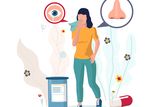Neglecting social activities leads to degeneration of the brain and increases the risk of dementia - Prof Sabina Brennan
Why being lonely can become detrimental to your health
As humans our survival depends on us being social. We are instinctively predisposed to maintain proximity to other humans and to avoid isolation. Our survival depends on reciprocal relationships. We form bonds that provide mutual aid and social bonds keep us safe.
As humans we have a fundamental need for inclusion and this is why we tend to perish in isolation. Therefore, people with more social ties are less likely to develop dementia or cognitive impairment in later life than people with fewer social ties. People with more social ties also have better general health, are less depressed and live longer.
So let's look at this a little more in-depth to get a fuller picture.
Being social and social beings
Humans are highly skilled socially. The human brain evolved alongside these skills. The most recently evolved part of your brain, the neocortex, can be referred to as your 'thinking brain'. The oldest part of your brain that sits atop your spinal cord is known as the brain stem or the 'reptilian brain'. Your limbic brain, also known as your midbrain or emotional brain, is sandwiched between the two.
Dr Sabrina Brennan
You need your reptilian brain to control the functions most basic to your survival, such as your heartbeat, breathing and digestion. Your midbrain handles emotions, fear, stress and the unconscious judgements that can strongly influence your mood and behaviour. Your neocortex is capable of interpreting and formulating extremely complicated and sometimes conflicting information. It is responsible for complex functions such as language, thought, decision-making, impulse control and social skills. The actions of the midbrain are rapid, reflexive and instinctive. In contrast the neocortex is more reflective and slower, but has the capacity to act on, or override the midbrain which can in certain circumstances save our life, but is also prone to systematic errors. As you interact socially your reptilian, emotional and thinking brains work together via multiple operating systems, sometimes in coordination and sometimes in conflict, depending on the context.
The brains of humans, and indeed primates in general, appear to be particularly sensitive to social influences.
In primate species there is a relationship between the size of their social group and the relative volume of their neocortex. To survive in society, we have evolved in a way that allows us to communicate our intentions, motivations and emotions through posture, movements and facial expressions. These social interactions facilitate the growth of new brain cells (neurons) through increased neural activity. The complexities required for social living, including the ability to predict behaviour and outsmart others, may have led to the expansion of the human brain and to the elaboration of neural systems within the brain.
As you age, the rule is 'use it or lose it'. Neglecting social activities leads to disuse of the brain, which in turn is linked to atrophy of cognitive function. Also as you age neurons that are left out of action through lack of use become damaged and die. Unlike the physical stress of lifting weights in the gym, which ultimately builds muscle and strengthens bones, persistent social stress, such as prolonged social isolation and chronic loneliness, increases wear and tear throughout your body and your brain.
Isolation and loneliness
People with less social participation, less frequent social contact and more feelings of loneliness have an increased risk of developing dementia.
To put this in perspective, the risk associated with loneliness and social isolation is comparable in size with well-known risk factors for Alzheimer's disease including smoking and mid-life high blood pressure.
Feeling lonely and being alone are not the same thing. We can be alone, but not feel lonely and we can feel lonely and isolated when we are with others.
Feeling lonely makes us less likely to employ our social skills, and over time our social skills diminish through lack of use, so we may come across as socially awkward. But we do not become lonely because we are socially awkward, rather, we can become socially awkward through social isolation and loneliness.
Why do we feel lonely?
The sensations associated with loneliness evolved because they contribute to our survival as a species. Loneliness is a painful experience. Pain, information transmitted through the central nervous system, is a signal that we cannot ignore. Pain tells us to get out of this situation now. Just as physical pain evolved to protect us from physical dangers, the unpleasant social pain of loneliness evolved to protect us from the dangers of being isolated. Loneliness is an unpleasant feeling that we try to avoid.
A variety of neurological mechanisms have evolved that capitalise on 'aversive signals' to motivate us to engage in behaviour that is essential to our survival. Loneliness in small doses is adaptive because it spurs us on to seek social contact, but when we ignore the signal, loneliness can become chronic and a serious threat to our brain and general health.
Loneliness is a killer
Social isolation, and perceived isolation, negatively impacts on health through effects on the brain, on the physiological stress response, on sleep, on blood pressure, on inflammatory processes and on the immune system. People who are lonely, who live alone or who are socially isolated have an increased risk of early death. This is most likely a consequence of the impact that social deficits have on diseases that ultimately lead to death.
Being a member of a social species comes with benefits (protection and assistance) and costs (risk of infection and competition for food and for mates). From an evolutionary perspective, being isolated from our social group can be perilous, making us vulnerable to predators. Feelings of loneliness act as a biological warning, an alarm bell, motivating us to take action to avoid isolation.
However, the brain also switches into self-preservation mode when we feel socially isolated. Changes occur in the brain, which make us more alert to danger, more distrustful and less empathetic towards others. Ironically, this can make us more likely to isolate ourselves socially. If we remain lonely, over time our social skills become eroded through disuse.
Loneliness doesn't just make you feel unhappy, it can make you feel unsafe and interfere with sleep, which can have a knock-on effect on health, wellbeing and cognitive functions including the ability to learn and remember.
The release of cortisol and 'fight or flight' activity in the sympathetic nervous system can also overstimulate the inflammatory response and suppress our immune response. Chronic stress can also lead to shrinking of the prefrontal cortex, which plays a key role in regulating our social behaviour, allowing us to empathise with and make sense of the world. Loneliness is also associated with poor sleep quality and high blood pressure, both of which impact on cognitive function and our risk of developing dementia.
Loneliness is a serious problem that has deep roots in our biology as well as our social environment. We need to be aware that some of our brain's automatic and unconscious responses may colour our perception of the world, disabling our ability to empathise and tricking us into seeing threat where there is none.
But it is equally important to remember that while some of these responses are automatic and unconscious we do have some cognitive control. We can make choices. We can consciously take action to routinely engage more socially, and if we see others who have become isolated we need to help to reintegrate them in a way that takes account of the fact that their brain has undergone changes that makes them fearful, less empathetic and possibly socially inept.
Dr Sabina Brennan (PhD, C Psychol,PsSI) is author of the book, 100 Days to a Younger Brain: Maximise your memory, boost your brain health and defy dementia
Join the Irish Independent WhatsApp channel
Stay up to date with all the latest news














